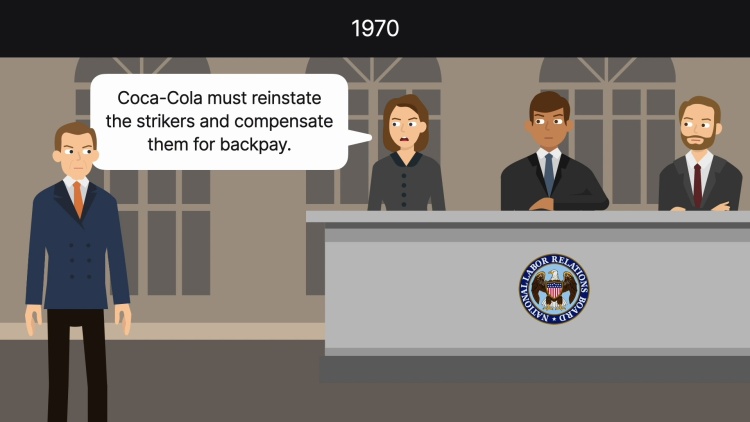Retail, Wholesale and Department Store Union v. National Labor Relations Board
United States Court of Appeals for the District of Columbia Circuit
466 F.2d 380 (1972)
- Written by Susie Cowen, JD
Facts
The Retail, Wholesale and Department Store Union (Union) (defendant) engaged in a strike against Coca Cola Bottling Works, Inc. The matter came before the National Labor Relations Board (NLRB) (plaintiff), which held that the employer had committed an unfair labor practice when it failed to hire workers who were permanently replaced during a strike for new job openings. This decision reflected a policy change for the NLRB, which, prior to 1968, had consistently enunciated and applied the rule that when an employer permanently replaces an economic striker, he is under no obligation to treat that striker other than as a new job applicant. In light of the United States Supreme Court’s decision in NLRB v. Fleetwood Trailer Co., 389 U.S. 375 (1967), the NLRB overturned this rule in 1968 in The Laidlaw Corporation, 171 NLRB No. 175 (1968). Specifically, in Laidlaw, the NLRB held that former strikers are entitled to offers of reinstatement to vacancies resulting from the subsequent departure of permanent replacements, and that they remain so entitled until they have obtained other regular and substantially equivalent employment. The NLRB sought enforcement of its order. The case came before the federal court of appeals, which considered whether the NLRB could retroactively apply the change in policy where that change was effectuated through adjudication rather than rulemaking.
Rule of Law
Issue
Holding and Reasoning (McGowen, J.)
What to do next…
Here's why 907,000 law students have relied on our case briefs:
- Written by law professors and practitioners, not other law students. 47,100 briefs, keyed to 996 casebooks. Top-notch customer support.
- The right amount of information, includes the facts, issues, rule of law, holding and reasoning, and any concurrences and dissents.
- Access in your classes, works on your mobile and tablet. Massive library of related video lessons and high quality multiple-choice questions.
- Easy to use, uniform format for every case brief. Written in plain English, not in legalese. Our briefs summarize and simplify; they don’t just repeat the court’s language.





